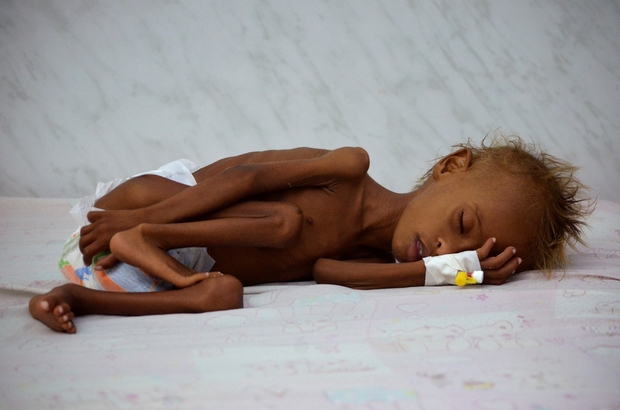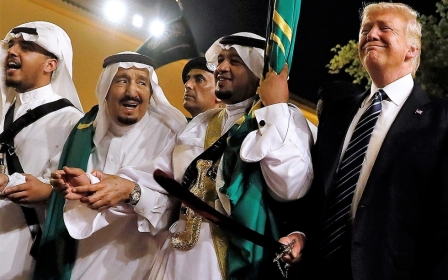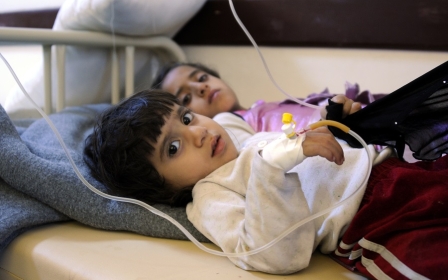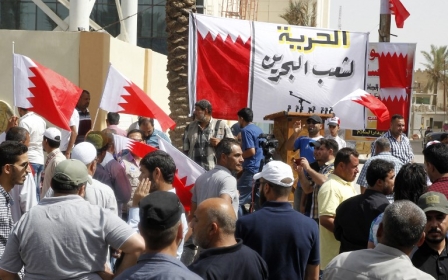How the Saudis see the war in Yemen
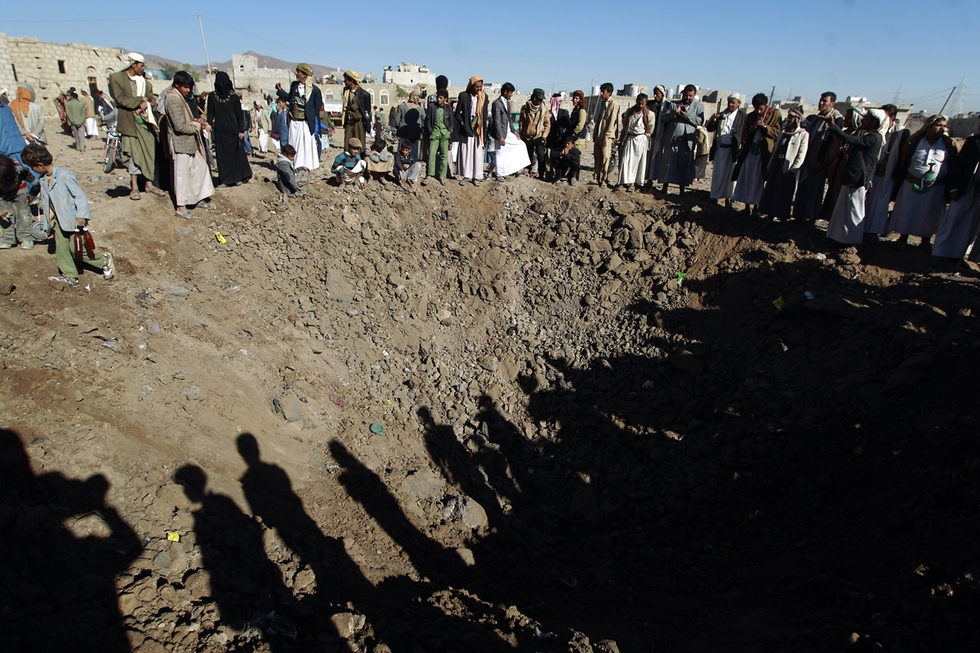
It is the 24th May and I am attending an invitation-only gathering in London. The Kingdom of Saudi Arabia has rolled out an impressive array of officials to present the Saudi perspective on the Yemen war.
Hosted by Chatham House and the Gulf Research Centre, panellists include the Saudi ambassador to Yemen as well as representatives from the kingdom's key ministries of interior and defence and from the King Salman Humanitarian Aid and Relief Centre.
The Saudis insist over and over again that they are seeking a political solution to the more than two-year-old war that has killed nearly 5,000 civilians, injured thousands more, damaged and destroyed critical infrastructure and left more than 80 percent of the population in urgent need of humanitarian aid.
They are perplexed and annoyed that the world seems to have ignored their side of the story. After all, it was the Saudis who responded to popular protests in Yemen in the aftermath of the Arab Spring. They were the ones who negotiated successfully to remove the longstanding president Ali Abdullah Saleh and to install his successor, Abd Rabbuh Mansour Hadi.
The Saudi view
The Houthis, armed and encouraged by Iran, overturned every effort at diplomatic initiatives, the Saudis say. With the help of the deposed Saleh and army forces still loyal to him, the Houthis took the capital Sanaa and chased out the legitimate government of President Hadi in 2014.
Iran is in Yemen to bring death, destruction and cholera
- Ambassador Mohamed Al-Jabir
It was only when Saleh's soldiers and the Houthis pushed south to the port of Aden that the Saudis and their coalition partners reluctantly launched an air campaign called Decisive Storm in March 2015. It was, we are told, done on behalf of the internationally recognised Hadi government. As one of the panel says: "We don't need justification, this is a war of necessity not a war of choice."
The Saudis, through the King Salman Humanitarian Aid and Relief Centre, are supplying US$8.2bn worth of aid to Yemen, a spokesman for the centre claims.
The defence ministry official informs us that coalition forces have shown themselves to be extremely careful in conducting air strikes, observing all international codes and laws and following up, with the assistance of the British and Americans, in assessing each and every strike through the Joint Incident Assessment Team otherwise known as JIAT.
Saudi Arabia continues to look for diplomatic solutions but at every turn they are thwarted by the Houthis. And the Houthis are backed by Iran. As Ambassador Mohamed Al-Jabir puts it: "Iran is in Yemen to bring death, destruction and cholera," the last mentioned referring to an epidemic threatening now to run out of control.
So there you have it. The Saudi perspective. And there is some truth to what we are being told. However, if you are one of the wealthiest countries in the world and you launch a hi-tech bombing campaign on one of the poorest and that campaign drags on and on with the world watching, well you should expect to get some bad press.
The Yemen narrative is a story of internal conflict and power struggles. It is 'a complex conflict with many different sides'
- Peter Salisbury, Chatham House
But the officials assembled before us are having none of that. Colonel Ahmed al-Aqeely for the Ministry of Defence marches us through a detailed debrief of just how careful the Saudis are when they drop bombs on Yemeni targets. With the benefit of slides, he rattles through the laws and protocols of conducting warfare. "Gentlemen," he exclaims, ignoring the dozen or so women in the room, "there are so many steps; we have to be careful."
Numerous NGOs and the UN itself have exhaustively detailed quite a different picture. To quote from just one, the Human Rights Watch World Report 2017:
"Dozens of coalition airstrikes indiscriminately or disproportionately killed and wounded thousands of civilians in violation of the laws of war. The coalition also used internationally banned cluster munitions."
The report does not spare the Houthi and the Saleh forces either, noting the indiscriminate laying of landmines, abuse of prisoners and the killing of hundreds of civilians with rocket fire in Yemen and southern Saudi Arabia. Even so, the Saudis routinely dismiss such investigations.
Iran on the march
But it is Iran that really draws their fire. No doubt the Saudis were emboldened by President Donald Trump's declaration in Riyadh two days earlier, when he spoke about defeating terrorism and isolating the Iranian government who give terrorists "safe harbour, financial backing, and the social standing needed for recruitment".
Iran has already taken over Iraq, is the claim. Together with Hezbollah it is in Syria. It is intent, says the ambassador, on "destroying the Arab Peninsula and sowing the seeds of destruction". The suggestion is that Iran has territorial ambitions to acquire Yemen.
'Daesh and Iran are the two main destabilisers, so if you invite Iran then invite Daesh'
- Dr Mustafa Alani, Gulf Research Council
In striving to establish that Saudi Arabia has no similar ambitions, The Gulf Research Council's Dr Mustafa Alani tells us there is "no desire for the land or wealth of Yemen. What is of value [to us] in Yemen? Absolutely nothing."
Chatham House's Peter Salisbury, a former journalist with many years of experience in Yemen, offers a nuanced perspective. "Iran," he says, "is not the core driver and there were other grievances that allowed the Houthis to rise." He cautions that the Yemen narrative is a story of internal conflict and power struggles. It is "a complex conflict with many different sides."
But the Saudis pretty much see only Iran. So I ask: "If Iran is central to the Yemen conflict and if, as you have said repeatedly, you want a political solution, why not ask the Iranians to the negotiating table?" I know in these enflamed times it is a most unlikely scenario, but I am curious to hear the replies.
Dr Alani has a quick answer: "Daesh [the Islamic State group] and Iran are the two main destabilisers, so if you invite Iran then invite Daesh." Now there is a view Donald Trump would no doubt applaud, just as long as he can claim it as his own.
Then it is the ambassador's turn. "Would you," he says, "ask the person that has destroyed your house to rebuild the house?"
But ambassador, I want to say, to the rest of the world it looks like it is you who are destroying the house.
- Bill Law is a Middle East analyst and a specialist in Gulf affairs. He tweets @billlaw49.
The views expressed in this article belong to the author and do not necessarily reflect the editorial policy of Middle East Eye.
Photo: Yemenis stand around the top of a bomb crater after a Saudi air strike on the Yemeni capital of Sanaa (AFP/WAM)
This article is available in French on Middle East Eye French edition.
Middle East Eye propose une couverture et une analyse indépendantes et incomparables du Moyen-Orient, de l’Afrique du Nord et d’autres régions du monde. Pour en savoir plus sur la reprise de ce contenu et les frais qui s’appliquent, veuillez remplir ce formulaire [en anglais]. Pour en savoir plus sur MEE, cliquez ici [en anglais].



